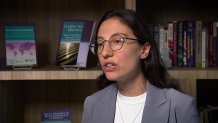The number of cases pending in United States immigration courts has reached more than 3.7 million, according to researchers who track court data nationwide.
Now, as the Trump administration aims to deport more migrants, there are new questions about whether a wave of additional cases could crush the already overwhelmed courts and slow the administration’s plans.
Watch NBC 5 free wherever you are
Immigration courts located in Texas have the nation’s second-largest backlog, with more than 490,000 pending cases, according to researchers at the Transactional Records Access Clearinghouse (TRAC), who analyze court data. In Dallas, the data shows the immigration courts located in a federal building downtown had a backlog of about 57,000 cases in 2020. That number has now grown to more than 232,000, an increase of roughly 300% over four years.
Retired immigration judge James Fujimoto knows the challenges the courts face first-hand. He said the word “overwhelmed” accurately describes the situation.
Get top local stories in DFW delivered to you every morning with NBC DFW's News Headlines newsletter.
“It’s a very fair word, absolutely,” Fujimoto said in an interview with NBC 5 Investigates.

With more than 3.7 million pending cases, Fujimoto estimated each immigration judge carried a load of about 4,000 or 5,000 cases.
NBC 5 Investigates
Uncover. Reveal. Expose.
“It's hard to put it into perspective when you really think about it,” Fujimoto said.
U.S. Immigration judges are Department of Justice employees and are not part of the independent federal judiciary.
“There are not enough immigration judges to be adjudicating all of these cases. So, they simply cannot keep up with the volume of cases being filed,” said Kathleen Bush-Joseph, an analyst with the non-partisan Migration Policy Institute.

Bush-Joseph said the massive backlog means people who deserve asylum protection wait years to receive it while others who are not eligible are allowed to remain in the country longer.
“This all comes back to how the U.S. immigration system in general is extremely outdated, overwhelmed, and under-resourced,” said Bush-Joseph.
In Texas, immigration attorneys like Haim Vasquez told us that migrants they represent now wait 3 to 5 years for their first day in court.
“They live in this limbo where the federal government is not able to make a decision or the case, but they still don't know what the future will be for them,” said Vasquez.

Vasquez said some people wait years to schedule their first court date. One of his clients, Iris Halpern, was apprehended crossing the border in 2021, but government prosecutors still have not filed paperwork to start the court process.
“There isn't even a date. It's very nerve-wracking because you feel like you're in the dark,” Halpern said in an interview.
Once Halpern’s initial court date is set, Vasquez said it will likely be set several more years away. He said clients with complex cases that cannot be decided in a single day sometimes wait years for a second court date.

The lengthy delays raise concerns about what will happen in the courts as the Trump administration works to increase the number of deportations.
Fujimoto said the current system is not set up to handle even a 30 to 50% increase in cases. He believed hiring more judges would help but would not solve the problem alone.
A 2023 Congressional Research Service report found that even if 700 more judges were hired, roughly double the current number, it would still take 10 years to clear the backlog.

Fujimoto said the courts need more support staff, including researchers and translators, and more prosecutors to expedite cases. He does not see a permanent solution unless Congress can agree on immigration policy changes that would help avoid swings in policy that can lead to sudden surges in case numbers.
“I find it hard to believe that you could fix this without some type of legislation because, as I said, otherwise, you just keep going back and forth. One party does this - here's my executive order – the other party comes in and says, I'm canceling that,” said Fujimoto.
A bipartisan immigration reform bill which included hiring more judges failed last summer after President Donald Trump urged Republicans in Congress to oppose it.
Some court analysts suggest the backlog could be reduced if prosecutors dismissed more sympathetic cases of migrants with no criminal background, which court watchers said has happened more often in recent years.
“The use of prosecutorial discretion has risen, and it's reflected how overwhelmed the system is,” said Bush-Joseph. However, she added that dismissals can often leave migrants in limbo, too, without formal approval to stay and work or an order to leave. This can cause many to file new asylum petitions, which are then sometimes kicked back to the overwhelmed courts.
Iris Halpern has now filed a petition to stay.
Since arriving, she has married a U.S. citizen and currently has temporary protected status extended to people who fled her native Venezuela. But that expires in April, and she worries stricter policies and jammed courts could complicate her future.

“We’re in nothingness. We started two years ago, and we don’t know," Halpern said.
NBC 5 Investigates reached out to the Trump administration to ask if there are plans to hire more immigration judges or whether the administration will try to keep cases out of backlogged courts by expanding the use of strategies like "expedited removal," where people are deported after just a brief hearing at a detention facility, or in some cases no hearing. Expedited removal has traditionally been applied only to migrants apprehended near the border who have been in the U.S. for less than two years, and civil rights groups worry expanding it could deprive many migrants of the due process they are entitled to under the law.
In a statement, principal deputy White House press secretary Harrison Fields said, “On day one, he (President Trump) took decisive action to address the border crisis, and his executive orders are already saving lives as hundreds of criminal aliens face immediate deportation. During his first term, he cut red tape to reduce massive immigration backlogs, and he will leave no stone unturned in fulfilling his promise to restore order at our border, deport criminal aliens, and fully enforce long-ignored immigration laws.”



